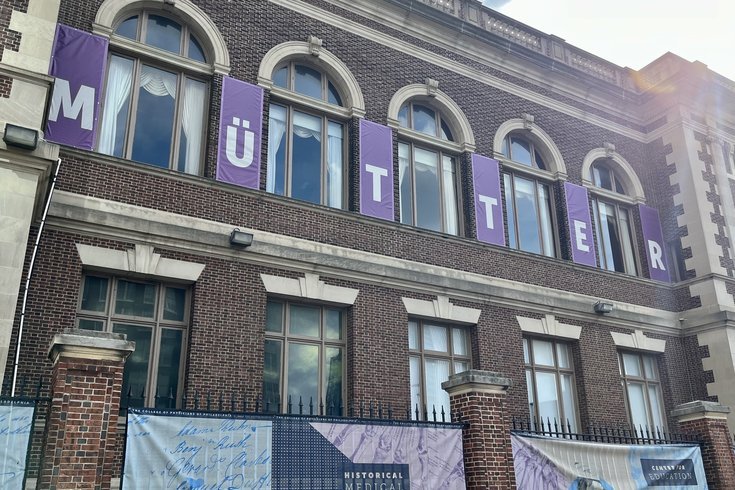
March 28, 2024
 Staff Photo/PhillyVoice
Staff Photo/PhillyVoice
The Mütter Museum's free open houses will be held on April 25, June 27, August 29 and a date to be determined in October — all from 3-7 p.m. The events are part of the museum's Postmortem project, which seeks public as the museum grapples with the ethics of displaying human remains.
The Mütter Museum is hosting a series of open houses as part of its effort to gather public input about the direction it should take in the face of a heated ethical debate about the thousands of human remains in its collections.
Postmortem, the public engagement initiative that began last year, aims to create discussions about the future of the 160-year-old museum operated by the College of Physicians of Philadelphia.
Museum leaders have become increasingly wary of displaying human remains, many of which were obtained before modern standards of consent had been established for their use in educational settings. Some longtime supporters of the Mütter believe that removing such remains, which highlight rare medical conditions, will fundamentally alter the spirit of the museum and stifle research in the name of shielding the public from the painful realities of medical history.
The first of four upcoming open houses will be held Thursday, April 25 from 3-7 p.m. It includes free access to the museum and opportunities to share feedback about current and future exhibitions. The next three will be held June 27, Aug. 29 and on an undetermined date in October.
People who attend can talk with facilitators as they move through the exhibits and can leave written comments near collection items "that intrigue, inspire, confuse, or concern them," the museum said. Guests also can share personal stories about their connections to the museum in a collections box and leave feedback on potential future exhibitions.
"These open houses are a different way of experiencing the museum because you can actively provide your thoughts as you move through the galleries," said Kate Quinn, who became Mütter Museum's executive director in 2022. "Our hope is that these free, after-hours opportunities make it easier for the public to provide feedback."
The Mütter kicked off Postmortem in October with a town hall meeting that was occasionally tense but drew thoughtful responses. It held its first open house in February.
Postmortem is supported by a $285,500 grant from The Pew Center for Arts & Heritage, which has enabled the Mütter to bring in outside experts from multiple disciplines to help navigate ethical questions about the purpose of medical history museums in the 21st century.
The museum is forming focus groups that specifically seek feedback from people who work in health care and education. Others will bring together people with disabilities and people of color, since these groups often were among those whose remains were obtained for display using methods that are no longer accepted. All of the museum's procurements are now obtained with consent from donors who must give the Mütter full discretion over how they'll be used, if at all.
Last year, the Mütter Museum removed all images and videos of human remains from its online galleries and launched a new collections database that catalogs these biological specimens with descriptions only. The museum's leadership previously conducted focus groups with residents of Mantua, a predominantly Black neighborhood in West Philly, and pointed to mixed feedback about some of the Mütter's current exhibits — including "uneasiness" about its preserved fetuses.
Weeks before the town hall last October, former College CEO Mira Irons, who hired Quinn, resigned from her role following months of controversy that drew international attention to the Mütter's ethical review. Quinn has argued that considerations about whether human remains can be displayed with dignity and respect are now central to the mission of museums.
"I am here (at the Mütter) every day because I believe in the power of what it is and what it can be and what it should be moving forward," Quinn said in an interview last October. "We're in a time that is not just affecting this institution and its collection of human remains, but every museum in the world is going through this very conversation. We have to reckon with the histories that are innate here that we inherited."
The most vocal critics of Quinn's leadership belong to a group called Protect the Mütter, which has worked to bring visibility to the debate and advocate on behalf of those who value the museum in its current state. Its members, who remain anonymous, question the museum's motives and feel the rhetoric Quinn uses is a pretext for gaining an accreditation that will help shift the Mütter into a contemporary health museum instead of upholding its unique legacy.
In January, the museum debuted a new exhibit, "Unhoused," that explores homelessness as a public health issue. It features a collection of cardboard signs that were carried by people on the streets over a period of three decades and showcases photos that are meant to humanize this population, making "the invisible visible again," Quinn said.
But Protect the Mütter organizers say they received feedback from visitors who were disturbed by the exhibit and thought it was a mismatch for the museum. They questioned the ethics of photographing homeless people and said the exhibit failed to fully explore the health challenges faced by the people the museum seeks to humanize.
People who plan to attend the upcoming open houses are encouraged to pre-register to reserve spaces, since the museum's capacity will be capped at 100 visitors per hour. Limited walk-in opportunities will be available. People who are interested in participating in focus groups are invited to fill out a form to be considered for the project.